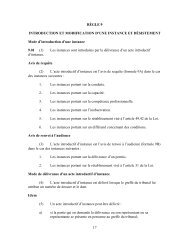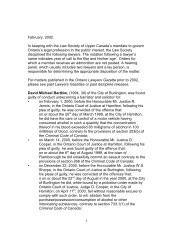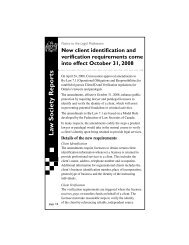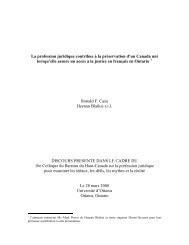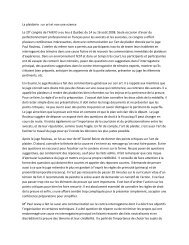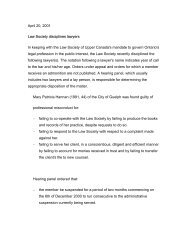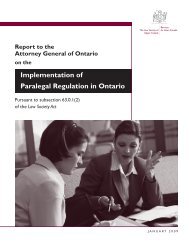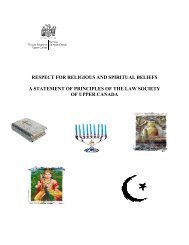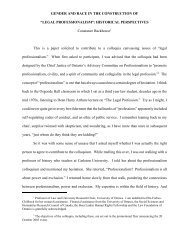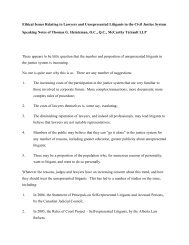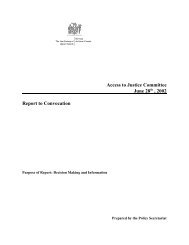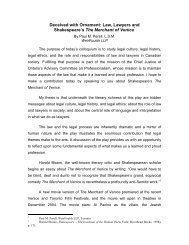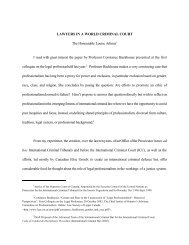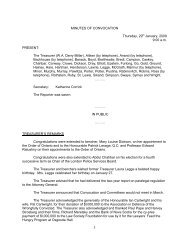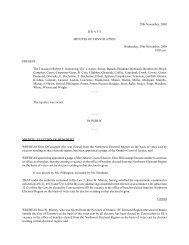Defining Professionalism - The Law Society of Upper Canada
Defining Professionalism - The Law Society of Upper Canada
Defining Professionalism - The Law Society of Upper Canada
Create successful ePaper yourself
Turn your PDF publications into a flip-book with our unique Google optimized e-Paper software.
CHIEF JUSTICE OF ONTARIOADVISORY COMMITTEE ON PROFESSIONALISMWORKING GROUP ON THE DEFINITION OF PROFESSIONALISM“ELEMENTS OF PROFESSIONALISM”IntroductionOCTOBER 2001(Revised December 2001 and June 2002)<strong>Pr<strong>of</strong>essionalism</strong> as a personal characteristic is revealed in an attitude and approach to anoccupation that is commonly characterized by intelligence, integrity, maturity, andthoughtfulness. <strong>The</strong> expectation among lawyers, whose occupation is defined as a pr<strong>of</strong>ession,and in the public who receive legal services, is that pr<strong>of</strong>essionalism will inform a lawyer’s workand conduct. Recently, however, concerns have been expressed about a decline inpr<strong>of</strong>essionalism, and there has been a renewed call for pr<strong>of</strong>essionalism among lawyers. <strong>The</strong> callis, in part, a response to a growing lack <strong>of</strong> civility by lawyers towards each other, to theopposition in a dispute, and, on occasion, to clients. <strong>The</strong>re is a perception that lawyers haveforsaken their pr<strong>of</strong>essional roots and see law more as a business than a calling. <strong>The</strong>sedevelopments create the need to inform lawyers and the public about pr<strong>of</strong>essionalism and todescribe the standards and values <strong>of</strong> pr<strong>of</strong>essional service and conduct.<strong>The</strong> Building Blocks <strong>of</strong> <strong>Pr<strong>of</strong>essionalism</strong><strong>Defining</strong> the elements <strong>of</strong> pr<strong>of</strong>essionalism involves identification and discussion <strong>of</strong> its variouscomponents - the “building blocks” <strong>of</strong> pr<strong>of</strong>essionalism. <strong>The</strong>y are: scholarship; integrity; honour;leadership; independence; pride; spirit; collegiality; service; and balanced commercialism.Scholarship<strong>Law</strong>yers must satisfy advanced educational requirements to be admitted to the pr<strong>of</strong>ession, andare expected to provide competent legal services throughout their careers. <strong>The</strong>y must be learned1
in the discipline and skills <strong>of</strong> the law. Legal education has been characterized as instructingindividuals how to think like lawyers. Anthony T. Kronman, the Dean <strong>of</strong> Yale <strong>Law</strong> School,explained:[thinking like lawyers] means, broadly speaking, to be attentive to thefacts and to know which ones in any given situation are important to beable to tell a story with the facts, to master the power <strong>of</strong> narration; torecognize what others hope to achieve, even or especially when they havea hard time defining their own ambitions, and to appreciate empathically arange <strong>of</strong> human purposes and values and ideals wider than one’s own, toknow the law and the legal system in which they serve.[from Anthony T. Kronman,“<strong>Pr<strong>of</strong>essionalism</strong>”, Journal <strong>of</strong> the Institutefor the Study <strong>of</strong> Legal Ethics, Vol. 2, 1999, page 89]Pr<strong>of</strong>essional expertise, gained through experience, reinforced by mentors, augmented by theexample <strong>of</strong> peers, and developed by continuing legal education, gives the lawyer the ability toapply the relevant law to the client’s factual circumstances. It also gives the lawyer the ability toprovide independent legal advice and sage judgment, which abilities are among the goodlawyer’s most important and valuable attributes.IntegrityA lawyer should recognize ethical practice and conduct as a key component <strong>of</strong> pr<strong>of</strong>essionalism,but in addition to their obligations to observe ethical standards established by their governingbody, lawyers are expected to exhibit pr<strong>of</strong>essional self-discipline and high standards <strong>of</strong> character.<strong>Pr<strong>of</strong>essionalism</strong> transcends ethics as a higher standard that is expected <strong>of</strong> all lawyers. A lawyeraccepts individual responsibility for personal ethics but also a collective responsibility forensuring, so far as practicable, that the pr<strong>of</strong>ession as a whole discharges its role appropriatelyand ethically.<strong>Law</strong>yers are subject to self-regulation as members <strong>of</strong> their governing body which grants a licenseas a matter <strong>of</strong> privilege to practice law. This aspect <strong>of</strong> pr<strong>of</strong>essionalism has been identified bysome legal scholars as a social contract under which society has delegated self-regulatory powersto the legal pr<strong>of</strong>ession on the understanding that the pr<strong>of</strong>ession will exercise those powers in thepublic interest. In this sense, lawyers assume a moral and ethical obligation individually and2
collectively to perform their side <strong>of</strong> the implied bargain. <strong>The</strong> American Bar Association capturedthe thought well in the paragraph 11 <strong>of</strong> the Preamble to the Model Rules <strong>of</strong> Pr<strong>of</strong>essionalConduct, where integrity is closely linked to protection <strong>of</strong> lawyers’ self-regulation andindependence.<strong>The</strong> legal pr<strong>of</strong>ession’s relative autonomy carries with it special responsibilities <strong>of</strong>self-government. <strong>The</strong> pr<strong>of</strong>ession has a responsibility to assure that its regulationsare conceived in the public interest and not in furtherance <strong>of</strong> parochial or selfinterestedconcerns <strong>of</strong> the bar. Every lawyer is responsible for observance <strong>of</strong> theRules <strong>of</strong> Pr<strong>of</strong>essional Conduct. A lawyer should also aid in securing theirobservance by other lawyers. Neglect <strong>of</strong> these responsibilities compromises theindependence <strong>of</strong> the pr<strong>of</strong>ession and the public interest which it services.Thus, the lawyer’s dedication to personal and collective pr<strong>of</strong>essional responsibility supports andprotects other core values <strong>of</strong> the pr<strong>of</strong>ession and autonomous self-regulation.HonourClosely related to integrity is the concept <strong>of</strong> law as a noble pr<strong>of</strong>ession, not in the sense <strong>of</strong> statusbut as having the attributes <strong>of</strong> honour, dignity, courage, and dedication. Commentary to the <strong>Law</strong><strong>Society</strong>’s Role Statement describes honour as “the respect or esteem in which one is held byothers” and states that “the integrity and honour <strong>of</strong> the pr<strong>of</strong>ession as a whole depends on theintegrity <strong>of</strong> its individual members”. A similar sentiment can be expressed about the dignity <strong>of</strong>the pr<strong>of</strong>ession, <strong>of</strong> which lawyers are the guardians. <strong>The</strong> honour and dignity <strong>of</strong> the pr<strong>of</strong>essionmust be seen in lawyers’ everyday actions and attitudes towards peers, new members <strong>of</strong> thepr<strong>of</strong>ession, clients, judges and those who assist in the administration <strong>of</strong> justice.Character and courage are <strong>of</strong>ten best illustrated in the lawyer’s dedicated service to a client’sunpopular or provocative cause. Resolute representation will survive public censure or criticismbecause our justice system relies for its integrity on, among other things, loyal and independentcounsel to assist clients. While the lawyer’s personal and pr<strong>of</strong>essional character may be tested insuch circumstances, pr<strong>of</strong>essionalism demands the lawyer’s unwavering support as legal advisorin the face <strong>of</strong> attacks that may surround the client’s case.3
LeadershipFrom simple matters to those involving the most pr<strong>of</strong>ound human experiences, lawyers are calledupon to provide leadership. It may mean providing a path through complex laws and regulationsand guiding and advising the client on his or her intersection with the law and its intricacies. Itmay mean speaking out to address a systemic injustice. It may mean providing free legal servicesor education, serving on the boards <strong>of</strong> institutions and organizations where legal expertise andthe “thinking” <strong>of</strong> a lawyer is invaluable, or writing about the law in journals and newspapers.All <strong>of</strong> these activities translate into a valuable public service that can create order out <strong>of</strong> chaos,instill an accountability in society, and educate the public about what it is that lawyers do in legalsystems and why they do it. <strong>The</strong>se are the benefits <strong>of</strong> leadership inspired by pr<strong>of</strong>essionalism.Historically, lawyers have occupied positions <strong>of</strong> privilege and power in society - in business,politics and academia. In that sense, they are also leaders. <strong>Law</strong>yers in whom the trust <strong>of</strong> privateor public enterprises is placed strive to fulfil their leadership role with dedication and intensity.<strong>The</strong>y bring to those roles an individual responsibility that reflects the worthiness <strong>of</strong> thepr<strong>of</strong>ession and an honourable tradition. This too is a hallmark <strong>of</strong> a lawyer’s pr<strong>of</strong>essionalism.Independence<strong>The</strong> independence associated with the lawyer’s calling operates at two levels. <strong>The</strong> first is theindependence <strong>of</strong> the lawyer’s pr<strong>of</strong>essional judgment with respect to a particular client and theobligation to avoid conflicting interests that may affect the lawyer’s loyalty to the client. Thisduty, found in rules <strong>of</strong> conduct, is observed by lawyers as a matter <strong>of</strong> ethical conduct. <strong>The</strong>second feature <strong>of</strong> independence is related but broader. Pr<strong>of</strong>essor Robert W. Gordon <strong>of</strong> Yale <strong>Law</strong>School defined it when he described the pr<strong>of</strong>essional ideal as including a high degree <strong>of</strong>autonomy from external controls other than those imposed by self-regulation. He said:Pr<strong>of</strong>essional work, ideally, is self-directed and self-regulated to an unusual degreein the division <strong>of</strong> labour. <strong>The</strong> requirement <strong>of</strong> autonomy is said to follow from thepr<strong>of</strong>essional’s distinctive relations <strong>of</strong> trust and authority with clients...and his orher need to exercise independent discretionary judgment.4
As pr<strong>of</strong>essionals, lawyers are expected to act in a courteous, dignified and civil manner towardthe public they serve, other members <strong>of</strong> the pr<strong>of</strong>ession, and members <strong>of</strong> the judiciary. Civility isthe natural result <strong>of</strong> collegiality among members <strong>of</strong> the pr<strong>of</strong>ession, and that attitude should benurtured and encouraged by every lawyer. Collegiality undergirds pr<strong>of</strong>essional self-regulation,in which rules and standards are developed and applied collectively by members <strong>of</strong> thepr<strong>of</strong>ession itself, rather than by external bodies.Civility is not differentiated among barristers or solicitors, and spans the range <strong>of</strong> activitieslawyers perform in practice or employment. <strong>The</strong> broad responsibility is to the administration <strong>of</strong>justice, and as <strong>of</strong>ficers <strong>of</strong> the court, lawyers have a duty to the justice system to act withintegrity, an overarching responsibility that requires civil conduct. London lawyer MichaelEizenga, in commenting on civility, said:...thoughtful, open-minded and mutually respectful interactions between legalpr<strong>of</strong>essionals represent quintessentially civil conduct, and result in anamelioration <strong>of</strong> the fragmenting forces within our community. In this way,civility must be recognized as an instrumental value informing the conduct <strong>of</strong>citizenship in the legal pr<strong>of</strong>ession.[from “Citizenship in the Legal Pr<strong>of</strong>ession: Civility as an Instrumental Value in Self-Governance” by Michael Eizenga <strong>of</strong> Siskind, Cromary, Ivey and Dowler LLP, London,October 2000]Collegiality finds expression in the willingness <strong>of</strong> experienced lawyers to mentor those lessexperienced in the law. Successful mentoring involves the development <strong>of</strong> pr<strong>of</strong>essional andpersonal relationships <strong>of</strong> trust between junior and senior lawyers, and sharing <strong>of</strong> not onlypractical legal knowledge and expertise but standards for ethical conduct and pr<strong>of</strong>essionalvalues. <strong>The</strong> benefits <strong>of</strong> mentoring confirm its value as a tool <strong>of</strong> pr<strong>of</strong>essionalism: more competentlawyers, a more rewarding pr<strong>of</strong>essional experience and an improved work environment for newmembers <strong>of</strong> the pr<strong>of</strong>ession, and better pr<strong>of</strong>essional service to clients.Service to the public good<strong>Pr<strong>of</strong>essionalism</strong>, or the essence <strong>of</strong> a pr<strong>of</strong>essional, is distinguished by an element <strong>of</strong> trust thatclients, who generally are unable to assess the adequacy <strong>of</strong> the services provided, place in7
lawyers. That in turn imposes a moral obligation on lawyers to look after the interests <strong>of</strong> clients,an obligation not found in ordinary commercial relationships.<strong>Law</strong>yers also recognize a duty to serve in a way that protects public interests and promotes thepublic good. <strong>The</strong> lawyer’s public interest mentality finds expression, for example, in advancingaccess to the law and the legal system for all persons, regardless <strong>of</strong> their means or the popularity<strong>of</strong> their causes. Monroe H. Freedman, pr<strong>of</strong>essor <strong>of</strong> law at H<strong>of</strong>stra University School <strong>of</strong> <strong>Law</strong>,expanded on this concept as follows:...pr<strong>of</strong>essionalism means that a lawyer should:help members <strong>of</strong> the public to be aware <strong>of</strong> their legal rights and <strong>of</strong> the availability<strong>of</strong> legal services to achieve those rights;advise each client fully and candidly regarding the client’s legal rights and legaland moral obligations; andzealously and competently use all lawful means to protect and advance theclient’s lawful interests as the client determines those interests to be.[from Monroe H. Freedman,“<strong>The</strong> Golden Age <strong>of</strong> <strong>Law</strong> That Never Was”, Texas <strong>Law</strong>yer,January 7, 1991]<strong>Law</strong>yers, who are uniquely placed in the justice system, may experience tension between theprivate interests <strong>of</strong> clients and the public good. <strong>Law</strong>yers may be in the unenviable position <strong>of</strong>having to insist that a client refrain from actions that may be in the client’s self-interest butwhich subvert the administration <strong>of</strong> justice. It is a struggle between the duty to serve the clientand the equally important obligation to serve the law for society’s sake - a unique struggle thatdefines the lawyer as pr<strong>of</strong>essional.Balanced CommercialismIn 1953, Roscoe Pound, the American legal educator and jurist, defined pr<strong>of</strong>essionalism andrecognized that lawyers are engaged in making a living and a career:<strong>The</strong> term [pr<strong>of</strong>essionalism] refers to a group pursuing a learned art as a commoncalling in the spirit <strong>of</strong> public service - no less a public service because it mayincidentally be a means <strong>of</strong> livelihood. Pursuit <strong>of</strong> the learned art in the spirit <strong>of</strong> a8
public service is the primary purpose.[from Roscoe Pound, <strong>The</strong> <strong>Law</strong>yer from Antiquity to Modern Times (St. Paul, Minn.: WestPublishing Co., 1953) p. 5.]Applied to the legal pr<strong>of</strong>ession, this traditional definition focusses on the lawyer as an individualdedicated to public service, with income and status as worthy but not primary goals. Thiscontrasts with what some lawyers and members <strong>of</strong> the public see as today’s reality, namely,lawyers’ desire to maximize income and status with little or no attention to public service. Whilethe law-as-pr<strong>of</strong>ession vs. law-as-business dichotomy is not new, the intersection <strong>of</strong> these notionsleads to another important component <strong>of</strong> pr<strong>of</strong>essionalism, which might be called “balancedcommercialism”.William H. Hurlburt, in a 2000 paper prepared for the <strong>Law</strong> <strong>Society</strong> <strong>of</strong> Alberta and the Alberta<strong>Law</strong> Reform Institute, posited that lawyers are influenced by the prevailing business ethic, whichdoes not include a significant moral or public service element unless a significant moral or publicservice element helps to maximize pr<strong>of</strong>its. But he also argued that in addition to these strictlyeconomic and selfish factors, lawyers recognize an individual duty to advance their clients’interests by the provision <strong>of</strong> conscientious, competent legal services, and an individual duty toconduct their clients’ affairs according to accepted norms based on duty to clients and duty tosociety. He determined that this intersection <strong>of</strong> the traditional model and the economic orbusiness realities <strong>of</strong> practice does not ignore the fact that pr<strong>of</strong>essionals commonly provideservices in order to be paid for them. But he adds and emphasizes a dimension to lawyerpr<strong>of</strong>essionals’approach to providing pr<strong>of</strong>essional services that is not morally or ethicallyrequired <strong>of</strong> persons engaged in non-pr<strong>of</strong>essional occupations - an approach as a matter <strong>of</strong>obligation.It may at times be difficult to achieve the middle ground between public service orientation andeconomic demands. But while a lawyer’s self-interests are not ignored, pr<strong>of</strong>essionalismdemands that clients must be served and justice manifested. As the Creed <strong>of</strong> <strong>Pr<strong>of</strong>essionalism</strong> <strong>of</strong>the North Carolina Wake County/Tenth Judicial District Bar (February, 1997) states, “A lawyer9
need not sacrifice the opportunity to prosper, but the practice <strong>of</strong> law must be motivated byservice rather than inspired by pr<strong>of</strong>it.”ConclusionIn summary, the elements <strong>of</strong> pr<strong>of</strong>essionalism are$ Scholarship, through substantial intellectual training and development <strong>of</strong> legal skills,competence and expertise$ Integrity, illustrated through ethical and pr<strong>of</strong>essionally responsible conduct and practice$ Honour including integrity, dignity, courage, and upstanding character$ Leadership$ Independence, from the state and as the client’s loyal legal advisor$ Pride, with an appreciation for the history and tradition <strong>of</strong> the pr<strong>of</strong>ession and its moderncontribution$ Spirit and enthusiasm$ Collegiality and civility$ Service to the public good, through client relationships and responsibilities to theadministration <strong>of</strong> justice$ Balanced commercialism, a livelihood motivated by serviceRoger Cramton, pr<strong>of</strong>essor <strong>of</strong> law at Cornell <strong>Law</strong> School, posed the following challenge:Although the sense <strong>of</strong> lawyers’ pr<strong>of</strong>essionalism is threatened ... a more importantissue is whether there is a threat to what the public is entitled to expect: competentlegal services at a reasonable price from pr<strong>of</strong>essionals who do not abuse their trustand who act in the public interest.[from Roger C. Cramton, “<strong>The</strong> Changing Legal Pr<strong>of</strong>ession”, ILR Report (Spring 1990)]<strong>The</strong> answer to the challenge is pr<strong>of</strong>essionalism as described above. As an essential element <strong>of</strong> thevocation <strong>of</strong> law, pr<strong>of</strong>essionalism must be a part <strong>of</strong> the lawyer’s everyday work. <strong>Pr<strong>of</strong>essionalism</strong>gains substance and utility when linked to a lawyer’s understanding <strong>of</strong> the legal pr<strong>of</strong>ession’s rolein society and when exercised in service to the public.10



